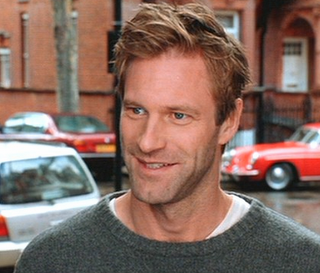Aaron ECKHART ... On Books and Reading
 AARON ECKHART lit up the screen with his understated performance with Gwyneth Paltrow in the screen adaptation of A.S. Byatt’s Possession (1990).
AARON ECKHART lit up the screen with his understated performance with Gwyneth Paltrow in the screen adaptation of A.S. Byatt’s Possession (1990). Aaron Eckhart ... On books and reading
Aaron Eckhart ... On books and reading“I read a lot of stuff. Sometimes, though, the places and the cases in contemporary novels begin to feel familiar. It seems like a swear word suffices to express anger. That’s when I go back to classics—or the occasional spy novel. I like descriptive language. I like writers who create complicated or poetic images or a world that is completely unfamiliar—the writers who dress things up a little bit.
“The romance of these kinds of books resonates with me. By romance, I mean more than a love story. These writers so often take on the idea of how a man conducts his life—usually a man who believes in something when everyone else is persecuting him for it. While he may have failed thousands of times, he has a vision of something tangible. In those circumstances, the great ones rise. And that, to me, is a romantic notion. That’s what I like. I like the guys who forge ahead.”
What’s on Aaron Eckhart’s bookshelf?
1. For Whom the Bell Tolls (1940) / Ernest Hemingway
“I first read this when I was in drama school in Australia. Like many Hemingway heroes, Robert Jordan, an American in the Spanish Civil War, is a man who tests himself. But what I come back to with Hemingway is how he captures the finiteness of love. The couples are destined to fail—you know that from the first moment—but he makes you believe that the memory is enough for these men.”
2. Of Human Bondage (1915) / W. Somerset Maugham
“A child named Philip—with a clubfoot, no money, no social graces—is orphaned at the age of 9. This character has absolutely no advantages. But Philip wants to be an artist, and despite a lack of funds, he does the unthinkable—moves to Paris to pursue his art. My mother told me about this book when I was trying to become an artist myself. I went to New York with no money, didn’t know anybody, but the idea that you could pursue something, even after repeated failures, was what I got from this book.”
3. Plum Island (1997) / Nelson DeMille
“I love spy novels, and I love DeMille’s hero. He’s introduced in chapter one like this: ‘I, John Corey, by name, convalescing cop by profession, was sitting … deep in a wicker chair with shallow thoughts running through my mind.’ He’s funny, he’s tough, he’s reluctant, he’s cool. He always has a quick comeback. And he gets great women. He’s a character I’ve always wanted to play.”
4. Don Quixote (1605) / Miguel de Cervantes
“Among the misadventures of Don Quixote, I always remember the novella of The Man Who Was Recklessly Curious, which is about two dear friends. One falls for the prettiest woman in town. Their marriage is unimaginably good, except the man can’t help but test it. He convinces his friend to woo his wife, to see if her love is real. Short story—it ends in disaster. For me, those few chapters are the best example of why you don’t mess with perfection.”
5. The Idiot (1869) / Fyodor Dostoyevsky
“This novel revolves around an epileptic prince named Myshkin, who leaves a clinic in Switzerland to return home to Russia. I was living in England when I read this, at the end of the Cold War, and what I knew about Russia was its ‘otherness.’ Myshkin exists on compassion and emotion—he does appear the idiot. But there is something about his ability to forgive that I loved, that seemed to transcend the idea of ‘us’ and ‘them.’”
Source: O, The Oprah Magazine


0 Comments:
Post a Comment
<< Home